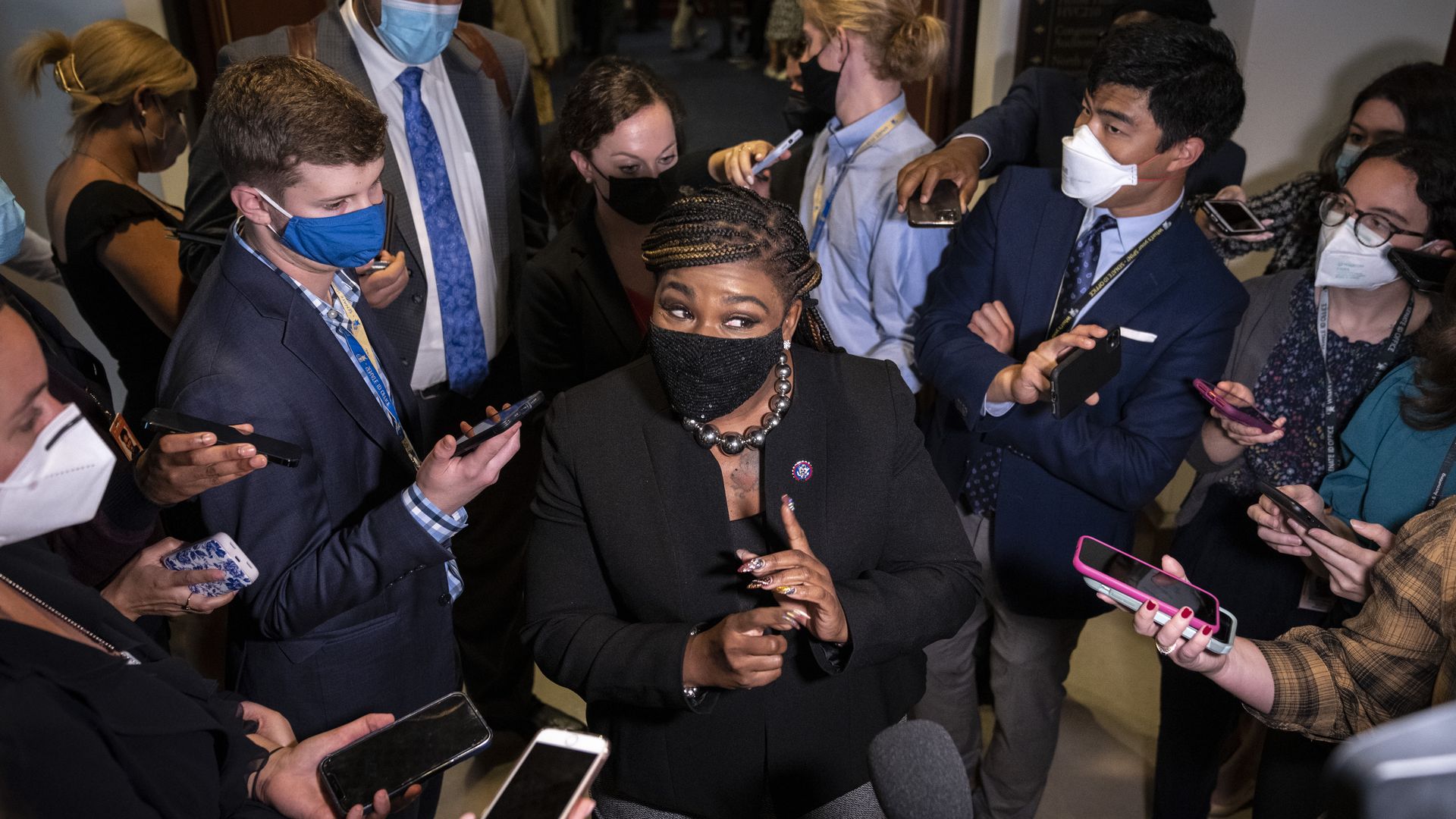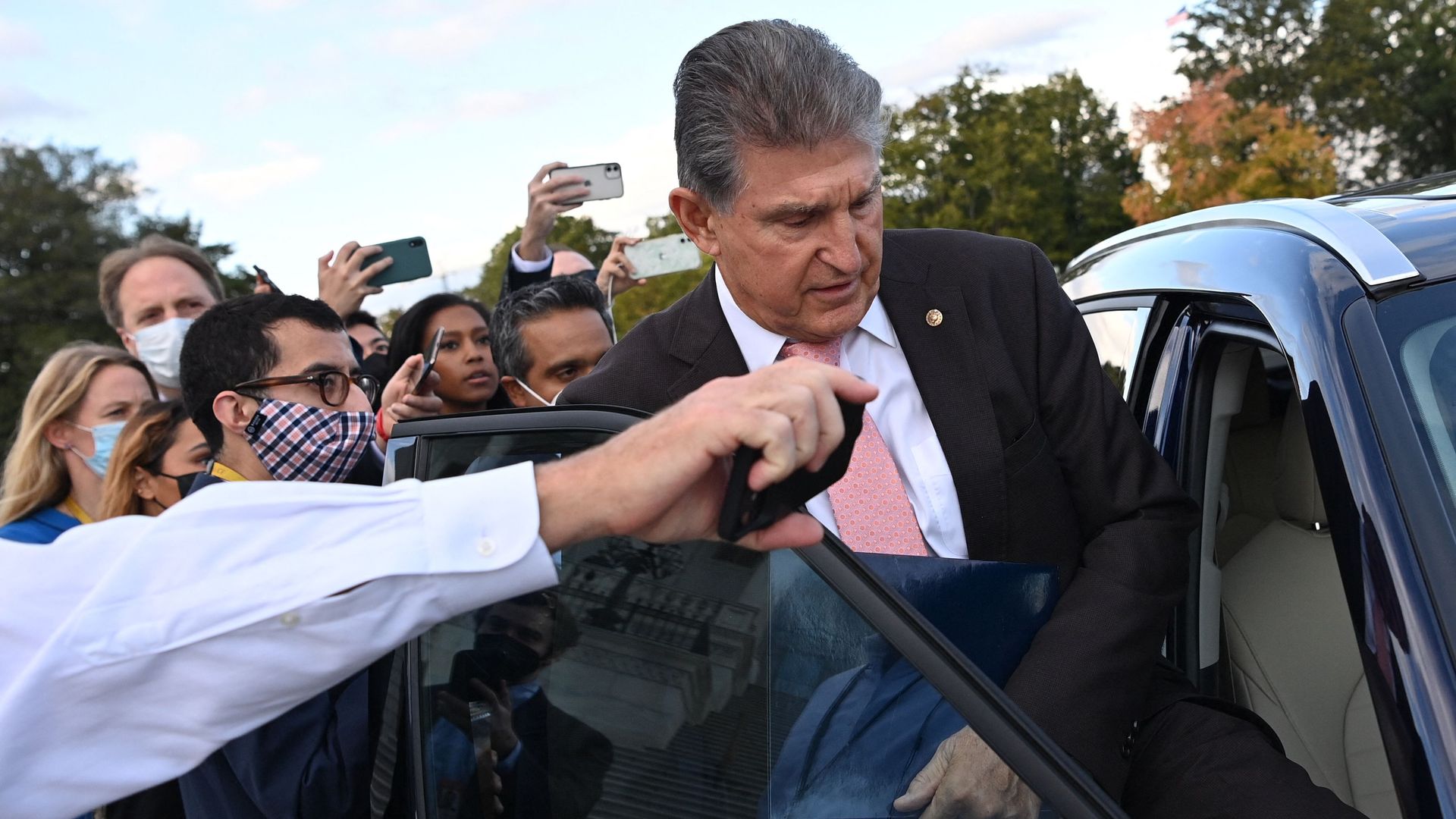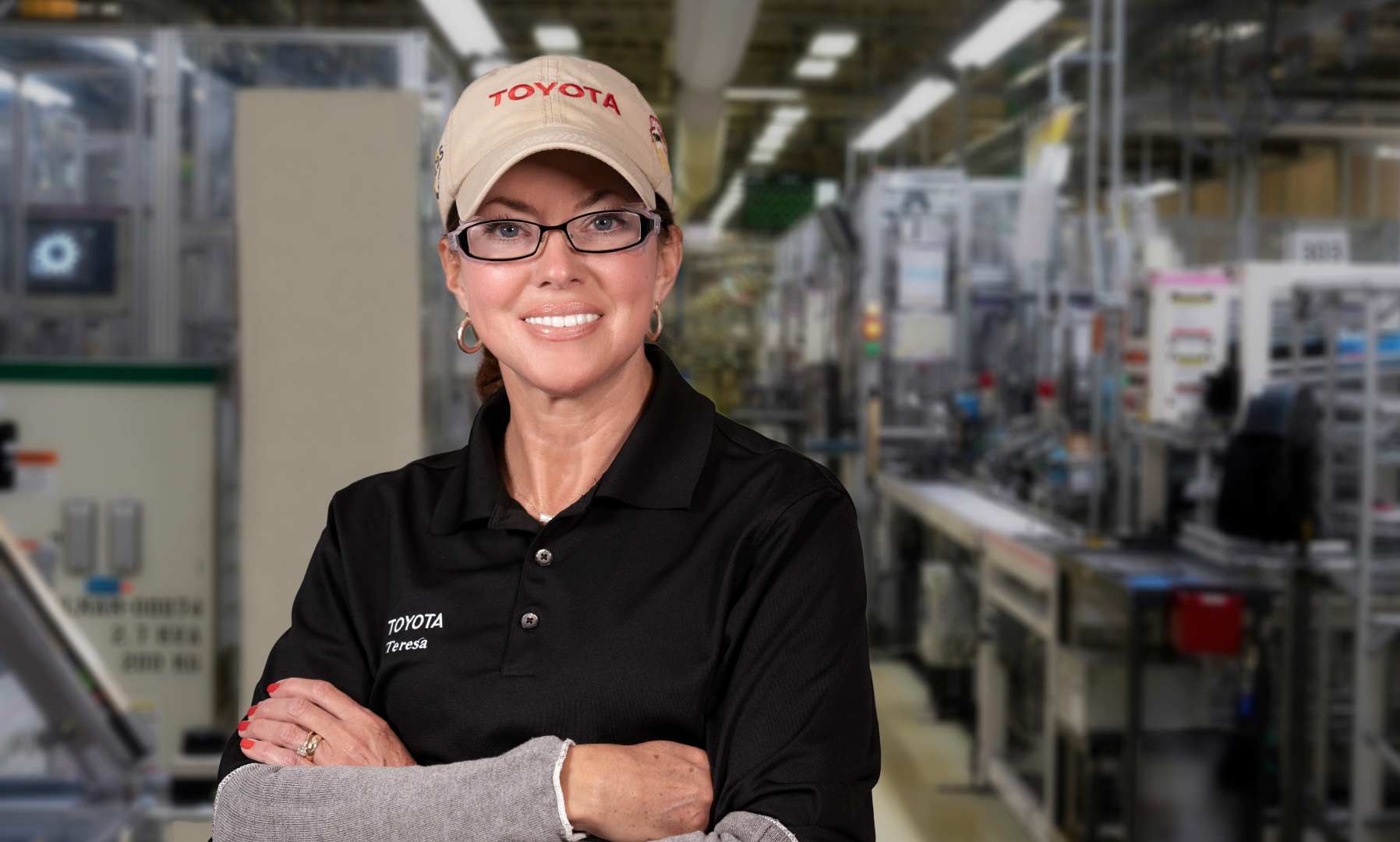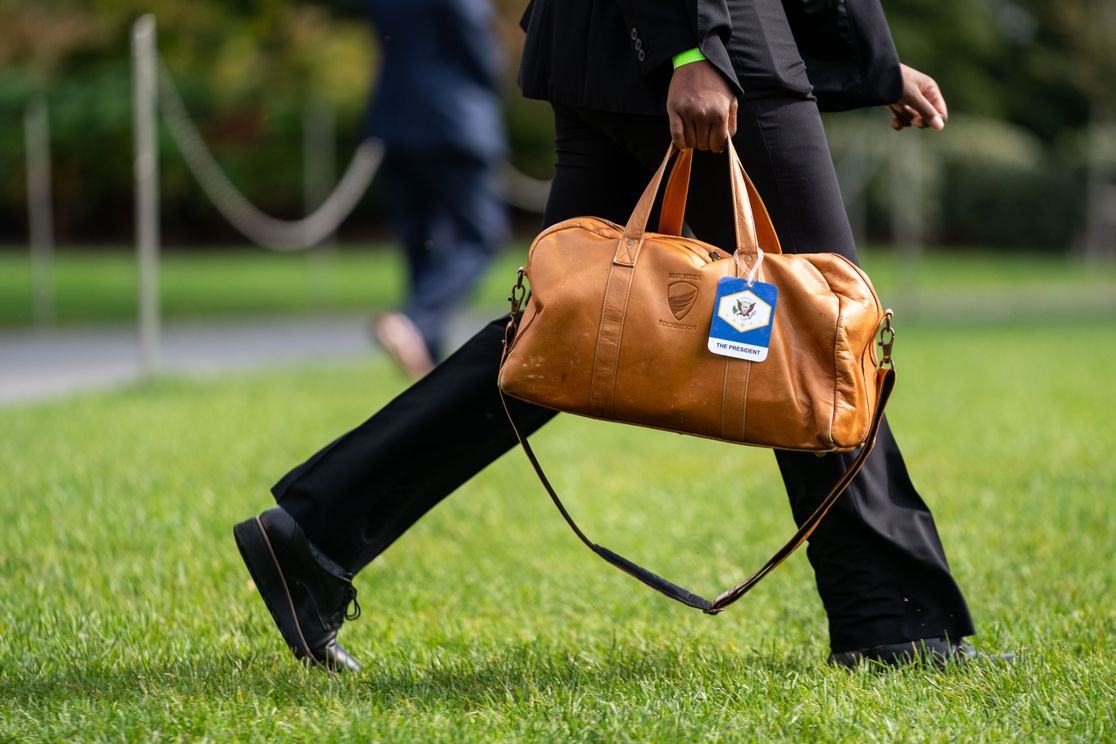| | | | | | | Presented By Toyota | | | | Axios Sneak Peek | | By the Axios Politics team ·Oct 28, 2021 | | Welcome back to Sneak. So, that was a day — or was it a year? Smart Brevity™ count: 1,357 words ... 5 minutes. Edited by Glen Johnson. | | | | | | 1 big thing: "Bamboozled" by Biden |  | | | Rep. Cori Bush speaks after President Biden met with House Democrats today. Photo: Drew Angerer/Getty Images | | | | President Biden and House Speaker Nancy Pelosi huffed and puffed today, but it was progressives who threatened to blow the whole House down if their demands weren't met, write Axios' Andrew Solender and Sarah Mucha. Why it matters: The old guard leading the White House and Congress has learned for the second time in a month their pressure tactics no longer work with a new wave of Democrats. And in their high-stakes game of chicken, each is warning the other their demands could cost the party the White House and its congressional majorities. - The split over whether to pass the $1.2 trillion bipartisan infrastructure bill without first passing the president's $1.75 trillion social safety net expansion sparked deep emotions on both sides.
- "I feel a little bamboozled, because this is not what I thought was coming today," Rep. Cori Bush (D-Mo.) said after Biden met with the House Democratic caucus. Bush said the two packages need to "ride together."
- Biden bluntly told his fellow Democrats: "The House and Senate majorities and my presidency will be determined by what happens in the next week."
Even after a text of the bill was released — a nonnegotiable demand of progressives — the Congressional Progressive Caucus said that wasn't enough. - "There is too much at stake for working families and our communities to settle for something that can be later misunderstood, amended or abandoned altogether," the group said in a statement this evening.
- "That is why dozens of our members insist on keeping both bills linked and cannot vote only for one until they can be voted on together."
The big picture: Biden tried to set off a legislative depth charge this morning. With Pelosi's support, he made a declaration without a deal. - Biden said a framework for the $1.75 trillion package should be enough to win the progressives' support for the $1.2 trillion roads and bridges bill that's already cleared the Senate — with Republican support.
- The president even delayed his trip to Rome for the G20 summit to make his case in person before the Democratic caucus.
- But the progressives, cheered on by their Senate compatriot, Sen. Bernie Sanders (I-Vt.), stuck by their demand to have both bills voted upon simultaneously.
- That set off a furious, daylong scramble to mollify the holdouts.
Between the lines: Pelosi told the caucus attendees she wanted the infrastructure bill passed by the time Biden landed in Italy. - She then sat silently in the room as progressives huddled, seeing if they would yield to her demand.
Keep reading. |     | | | | | | 2. Manchin in the middle |  | | | Sen. Joe Manchin leaves the Capitol today. Photo: Mandel Ngan/AFP via Getty Images | | | | The House whip operation is working to convince Sen. Joe Manchin (D-W.Va.) to issue a more forceful statement in support of the $1.75 trillion package, people familiar with the matter tell Axios' Hans Nichols and Andrew. Why it matters: Vote counters in the House are looking for Manchin to help them seal the deal to get progressives to vote for the $1.2 trillion bipartisan bill. - The emerging campaign to pressure Manchin to warmly and publicly embrace Biden's framework reveals a lack of trust among moderates, progressives and the White House.
- The campaign to pressure Manchin also indicates the failure of Biden's visit to the House this morning.
Driving the news: Manchin was relatively quiet in public most of today, saying the fate of the social spending bill was "in the hands of the House." - Told later progressives wanted him to publicly proclaim his support, the senator said, "If they can't take the word of the president of the United States, and the speaker, we are in trouble," CNN's Manu Raju tweeted. "We are going to work in good faith."
- His fellow moderate, Sen. Kyrsten Sinema (D-Ariz.) offered explicit praise for the framework but pointedly did not commit to voting for it.
The big picture: Manchin also was the subject of intense lobbying among his fellow senators on the substance of the social spending bill. - Some senators tried to convince him to fully embrace the current deal, while others hoped to convince him to help them alter it.
- Sen. Kirsten Gillibrand (D-N.Y.) waited for Manchin at one point to finish speaking with reporters before lobbying him to support paid family leave — not letting him escape without saying her piece.
- "If you let me write it, I will write it. I just want it in this bill," she said in a voice loud enough to be heard by a reporter. "It's so cheap."
|     | | | | | | 3. By the numbers: Who really cares? |  Data: Google Trends; Chart: Axios Visuals The White House, Senate and House have been consumed this week with passing the two massive infrastructure-related bills — but the rest of the country has had other things on its mind, according to Google Trends data reviewed by Axios' Stef Kight. By the numbers: Compared to the states, the District of Columbia, by far, has had the most search interest in the topic of infrastructure over the past 30 days. Maryland and Virginia — D.C.'s neighbors — came in third and fourth. - Google Trends uses an index of 0-100 to measure search interest.
- D.C. had the highest percentage of searches for the topic of infrastructure than any of the states.
- Montana was an outlier, taking second place amid the members of the DMV. It stands to get a lot of money under the legislation.
The bottom line: While the trillions in "hard" and "soft" infrastructure would impact communities and families throughout the country, the political hype has been greatest inside the arena — the nation's capital. |     | | | | | | A message from Toyota | | How the new EV tax proposal hurts autoworkers and the environment | | |  | | | | The new electric vehicle (EV) tax proposal gives some EVs made by American autoworkers special tax incentives but not others. The result: This would divide American autoworkers and doesn't help the industry grow, while also running counter to battling climate change. Learn why. | | | | | | 4. GOP rethinks super PACs |  | | | Illustration: Annelise Capossela/Axios | | | | Republicans are increasingly rethinking how to use one of the most potent political tools of the modern era, the super PAC, GOP operatives tell Axios' Lachlan Markay. Why it matters: Super PACs are generally thought of as vehicles for massive political ad buys. But Republicans are now employing them in more targeted efforts to build the party and its candidates a more robust grassroots fundraising operation. What's happening: The trend is evident in Ohio, where Republican Senate candidate J.D. Vance enjoys the backing of super PAC Protect Ohio Values. It's largely financed with $10 million from billionaire tech investor Peter Thiel. - POV hasn't spent a dime of that massive war chest on TV or radio advertising, even as groups backing Vance's primary rivals spend huge sums on broadcast ads attacking him.
- Instead, POV's direct pro-Vance advocacy has come in the form of digital ads and text messages. It's spent hundreds of thousands more on data modeling, polling and research — activities traditionally housed in a campaign itself.
- The result is a primed list of donors and supporters that Vance's campaign itself can tap for financial backing.
- It started doing so last week, when the campaign began sending fundraising emails to the Protect Ohio Values email list — a perfectly legal maneuver, as long as the campaign paid fair market value to rent it.
What they're saying: "Having substantial early support lets us do innovative things we wouldn't otherwise have the time to do, and helps us act as a force-multiplier over the course of a race," POV executive director Luke Thompson told Axios. The big picture: Republican super PACs have outspent their Democratic counterparts in five of the six election cycles since the Supreme Court's "Citizens United" decision, according to OpenSecrets data. - But there are fewer restrictions on money raised by campaigns directly, and they pay lower rates for broadcast advertising. In general, that makes each campaign dollar more valuable than each super PAC dollar.
- Republicans want to translate more of their independent groups' huge "soft" money support into "hard" dollars for their candidates and party committees.
Steven Law, who leads the powerhouse Senate Leadership Fund, noted his team has been working for a couple of years to build up precisely that capability. - "The most visible part of what we do, obviously, is paid media, but there's a much larger cycle-over-cycle investment that we make in solving infrastructure problems," he told Axios.
Keep reading. |     | | | | | | 5. Pics du jour: Traveling light |  | | | Photo: Kent Nishimura/Los Angeles Times via Getty Images | | | | President Biden held only a pen — and the first lady's hand — as he left the White House to begin his trip to Rome. Photo: Kent Nishimura/Los Angeles Times via Getty Images An aide, though, toted the president's carry-on — a leather duffle emblazoned with the logo of the Beau Biden Foundation. - The bag tag read simply, "The President."
|     | | | | | | A message from Toyota | | How the new EV tax proposal divides American autoworkers | | |  | | | | U.S. automakers and lawmakers agree that consumer incentives will help make EVs accessible, getting more EVs on the road and less carbon in the air. The challenge: By not providing equal incentives, the EV tax proposal hurts hardworking Americans and runs counter to battling climate change. | | | | 📬 Thanks for reading this very busy week. We'll be back Sunday. A reminder that your family, friends and colleagues can subscribe to Sneak or any of Axios' other free local and national newsletters through this link. |  | | It'll help you deliver employee communications more effectively. | | | | | | Axios thanks our partners for supporting our newsletters. If you're interested in advertising, learn more here.
Sponsorship has no influence on editorial content. Axios, 3100 Clarendon Blvd, Suite 1300, Arlington VA 22201 | | | You received this email because you signed up for newsletters from Axios.
Change your preferences or unsubscribe here. | | | Was this email forwarded to you?
Sign up now to get Axios in your inbox. | | | | Follow Axios on social media:    | | | | | |










No comments:
Post a Comment